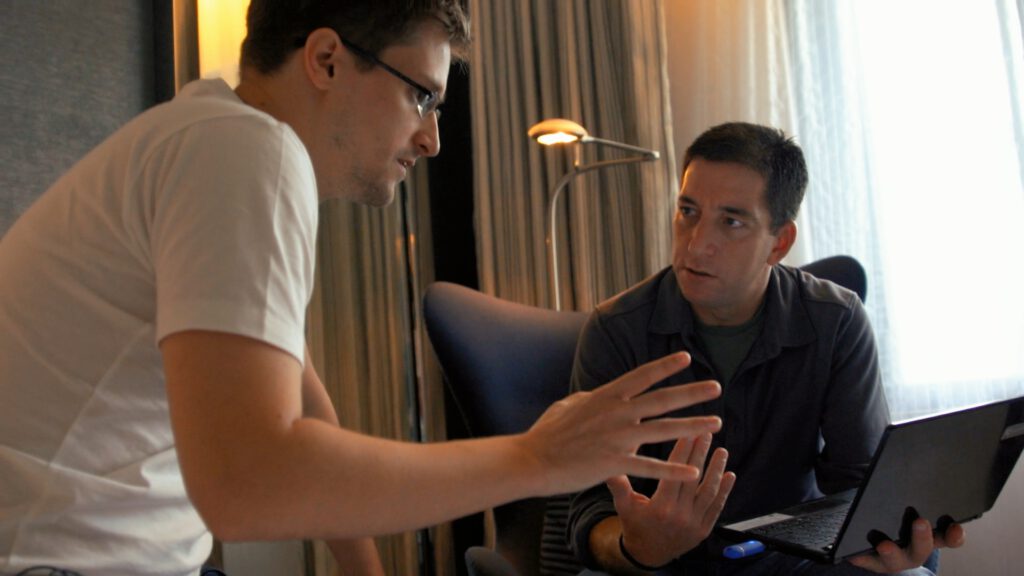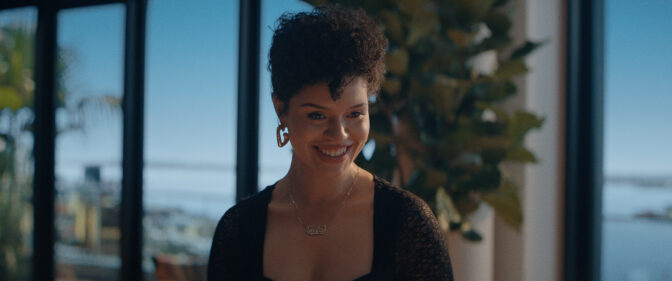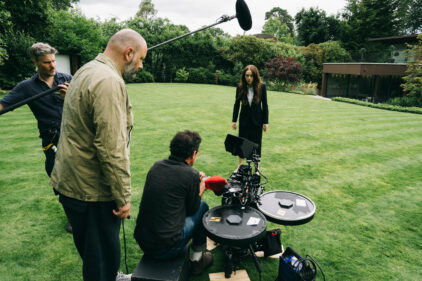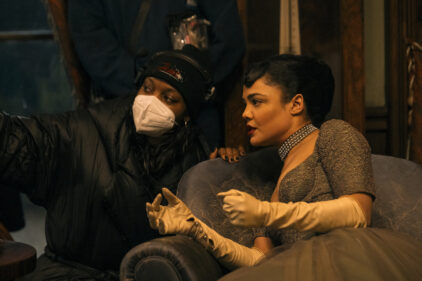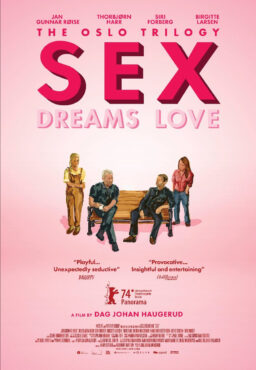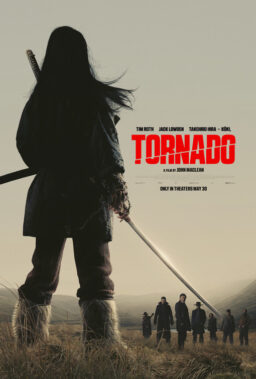Documentary
filmmaker Laura Poitras has trained her cameras on the post 9/11 world with the
feature films “My Country, My Country” (2006), which took a look at
the war in Iraq, and “The Oath” (2010), which focused on Guantanamo. She has received widespread critical acclaim, an Oscar
nomination for Best Documentary (for “My Country, My Country”) and a
place on a government watchlist. In early 2013, she began to receive a series
of encrypted emails by someone going by the handle of Citizenfour, who claimed
that he was in possession of shocking secrets regarding the expansion of
government surveillance programs that seemed to be gathering personal
information on virtually everyone, regardless of whether they were a legitimate
threat or not. After a few months of correspondence, she and journalist Glenn
Greenwald journeyed to Hong Kong to meet this source as he carried out his
intention to publicly release all the information that he had in his
possession. The source’s name, by the way, was Edward Snowden and his
revelations would inspire anger and outrage from people who lamented the
increasing loss of their civil liberties as well as those who felt that he was
a traitor who should be returned to America and thrown in prison for what he
had done.
While
Snowden was releasing the information, Poitras was filming the whole thing, and
the result is the fascinating new documentary “CitizenFour,” which
opens in New York this week and which is already being discussed as a
front-runner for this year’s Oscar for Best Documentary. Eschewing talking head
interviews and other standard documentary tropes for a more subjective,
fly-on-the-wall approach, she captures history as it is unfolds before her eyes, and manages to generate a surprising amount of tension and suspense despite
the fact that most people watching the film will no doubt now how the events will
unfold. And while the film is obviously on Snowden’s side, this is not a
propaganda piece dedicated to rehabilitating how he is seen by many who have
looked down on what he did—it sticks almost entirely to the unfolding events
and, with a couple of brief exceptions, does not go out of its way to deal with
him in a personal sense. Despite that,
watching the film, one gets a better grasp of Snowden, who is currently living
in Russia on a work visa, the information that he released and his motivations
in doing so than they have managed to get in most of the other coverage that
the story has received thus far in the media.
Recently,
Poitras, who now lives in Berlin, got on the phone to discuss
“Citizenfour,” Edward Snowden and the challenges of making a film
like this almost entirely in secret.

I understand
that you had been working on another documentary dealing with the subject of
government surveillance when the Edward Snowden story came your way—some of
that footage has even been incorporated into this film. What was the thrust of
that initial film and how radically did your approach and thoughts on the
subject change in the wake of what you were to learn?
LAURA POITRAS: I had
been working on a project about NSA surveillance that was focusing on several
people, including William Binney, the NSA whistleblower who was actually one of
the first people to come forward from the agency to reveal what was going on.
He blew the whistle on NSA surveillance in the immediate aftermath of 9/11. I
had begun filming with him and had actually made a short film about him and the
program he exposed called Stellar Wind that was published by the New York
Times. I think that was one of the reasons that Edward Snowden knew that I was
interested in the topic of surveillance. I had been following other people with
similar themes but of course, once I was contacted by Snowden, things did
change. One of the major things that changed was that I sort of became part of
the story and it became something that I would tell from my perspective because
I had become a participant in what had happened in the story.
In the film, you
show the initial exchange of encrypted emails that occurred between you and
Snowden before he eventually revealed his identity to you. During that time,
how long did it take for you to be convinced that this was real and not either
a joke or a potential set-up?
Obviously
I was skeptical and asked a lot of questions and one of the things that I was
worried about was if this was just a crazy person or if it was entrapment. I
asked him very directly, “How do I know you are not crazy or trying to
entrap me?” His response was very convincing—he said that he was not
trying to entrap me because he was not asking me to do anything. He said that
he was taking the risks and that I would just be receiving the information. He
said that he wasn’t crazy because when I had the information and confronted
officials, their response would tell me that. That was the sort of process that
I went through but my instinct was genuine and that was pretty early on—maybe
the second or third email, which would have been early February, 2013. I
continued to ask questions because you always want to be skeptical in a case
like this but my instincts said that it was legit.

When you finally
met Snowden face to face, what were your initial impressions of him?
I had made
some impressions of him through our correspondence because we had corresponded
for about five months. I had an understanding of what motivated him and why he
was doing what he did but it was different to actually meet the person. One of
the things that we were most surprised about was how young he was. I had
imagined him to be somebody who was older but there were things over the course
of our correspondence that were consistent in terms of his decision making and
why he felt that the public should know about what the government is doing and
that these things shouldn’t be happening in secret.
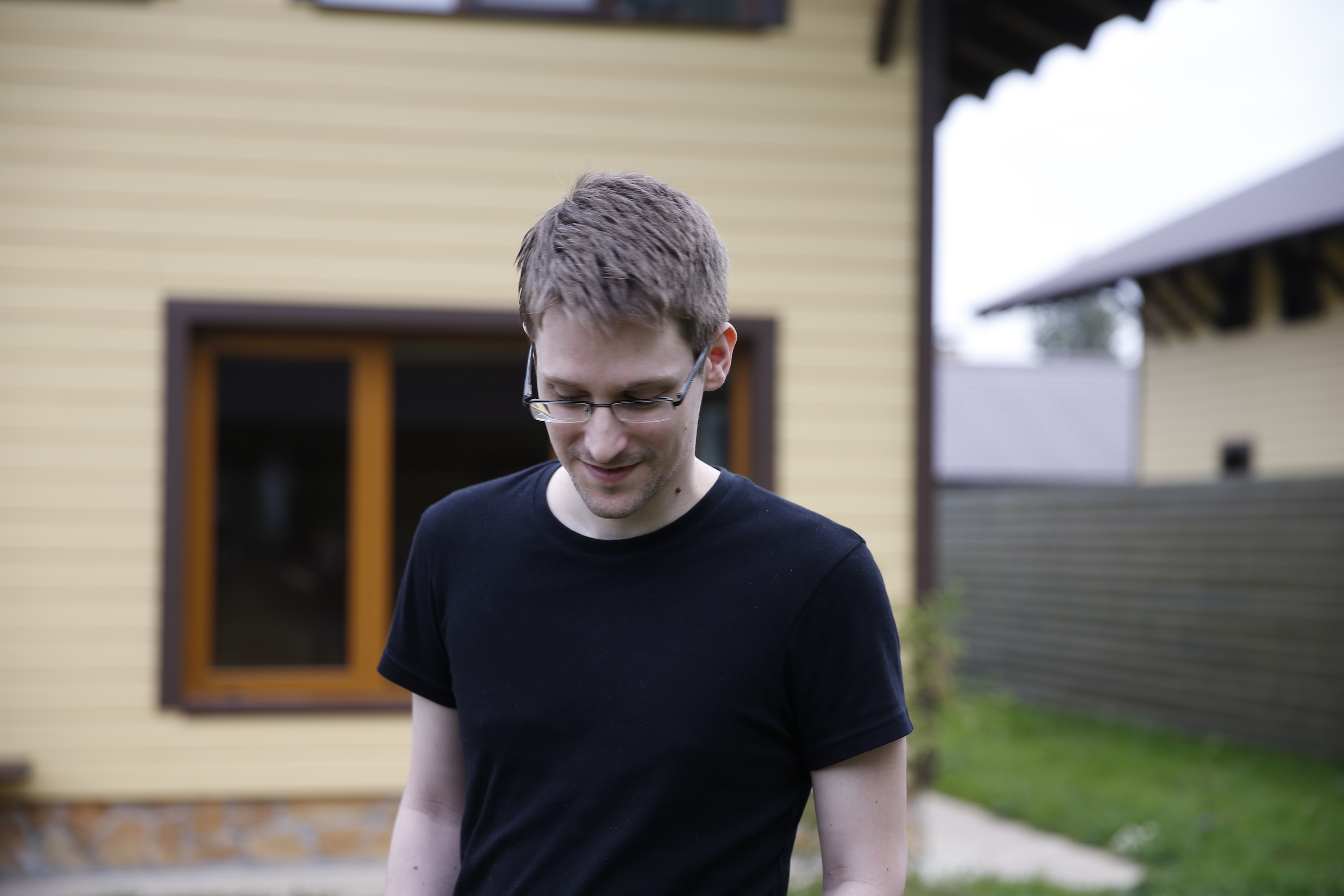
What was your
reaction once you began to realize the sheer size and scope of the information
that he had in his possession?
For a
long time, I didn’t have any documents to support it but he was writing me
details about what it is and I was completely shocked. If what he was saying
was true, it would be a major story but it could also be quite dangerous
because it was clear that Snowden was taking great risks and it was also clear
that to report on this would come with risks, given the context of how the
government has responded to leakers and journalists currently. You have James
Risen being subpoenaed to reveal a source, the AP being subpoenaed to get phone
records and James Rosen was called a co-conspirator. It was all in the context
of thinking that this was genuine and if it was genuine, it was going to be
risky. I was very aware that the government has come down on journalists and
whistleblowers in the last few years.
Were there any
particular revelations in the documents that came as a surprise?
There
were many things that shocked me. For instance, the GCHQ targeting of engineers
at telecoms–having the individual names of people working at telecoms being in
documents and those people being tracked through Facebook and Linkedin. They
would get malware and that malware records their passwords and they can use the
passwords to get into the networks. In general, it was the scale and the
dragnet approach of targeting the communications of people who had been accused
of no wrongdoing and just collecting it so that the NSA could have it. That
kind of scale is the most disturbing thing. One of the documents refers to the
Internet Age as the golden age of signals intelligence–that was deeply
disturbing.

From a legal
standpoint, were there any concerns about filming these events?
From a
legal point, I had talked to several lawyers before traveling and they
basically said that the government hasn’t going after journalists yet with
things like the Espionage Act but that there is the risk that it could happen.
They did say that if I was going to meet him, I shouldn’t bring my camera. I
told them that no, I was going to bring my camera in order to document what
happens and they said that might bring a little risk to the situation but I
felt and Glen felt that it was important to document this. This was a rare
opportunity because in this case, the source wasn’t trying to remain
anonymous—he had intended to make his name known long before we arrived in
Hong Kong by revealing his identity. He had already made that decision and
therefore, to bring a camera after he had already made such risks that it
didn’t add to that.
From a
filmmaking perspective, did the unusual circumstances surrounding these events
require you to utilize a different approach to your work beyond the need to
become part of the on-screen story?
It was
clear once we got to the editing room that it would be a film that would have
to be told from a subjective point of view because I was a participant. That
was an obvious choice to make and it was made early on. It was a strange
situation because I was documenting things that I was also reporting on and
that was an experience that I had never been through before.
Was there any
thought given to including any government officials responding to these
revelations on camera or was the decision to stick exclusively to the
perspective of those making the revelations made relatively early in the
proceedings?
In my
previous films, I have tended to use a consistent approach in which I am
interested in a broad theme and then follow people who are the protagonists who
take us through the narrative. I don’t do lots of sit-down interviews and I
don’t have experts in them. If the NSA had opened their doors and shown me the
things that were happening, of course I
would have taken the opportunity but I don’t think that would have ever
happened.
“Citizenfour”
happens to be coming out in theaters a couple of weeks before the conclusion of
a midterm election cycle in which the subject of government surveillance has
not really come up as part of the discussion amongst candidates and voters
alike. Do you hope that the release of this film will help reignite interest in
the subject with the public?
I hope
the film communicates something about surveillance but the work that I do takes
years to make, so it wasn’t that I made it because of election cycles. Of
course, I believe that the government needs to take more action regarding these
policies and inform the public more about what they are doing. I think one of
the most disturbing things about the disclosures is how much is happening in
secret—that we have these secret agencies and secret courts and secret
interpretations of law. All these things, I think, are not what you want in a
healthy democracy—you want people to be informed about what their government
is doing.

